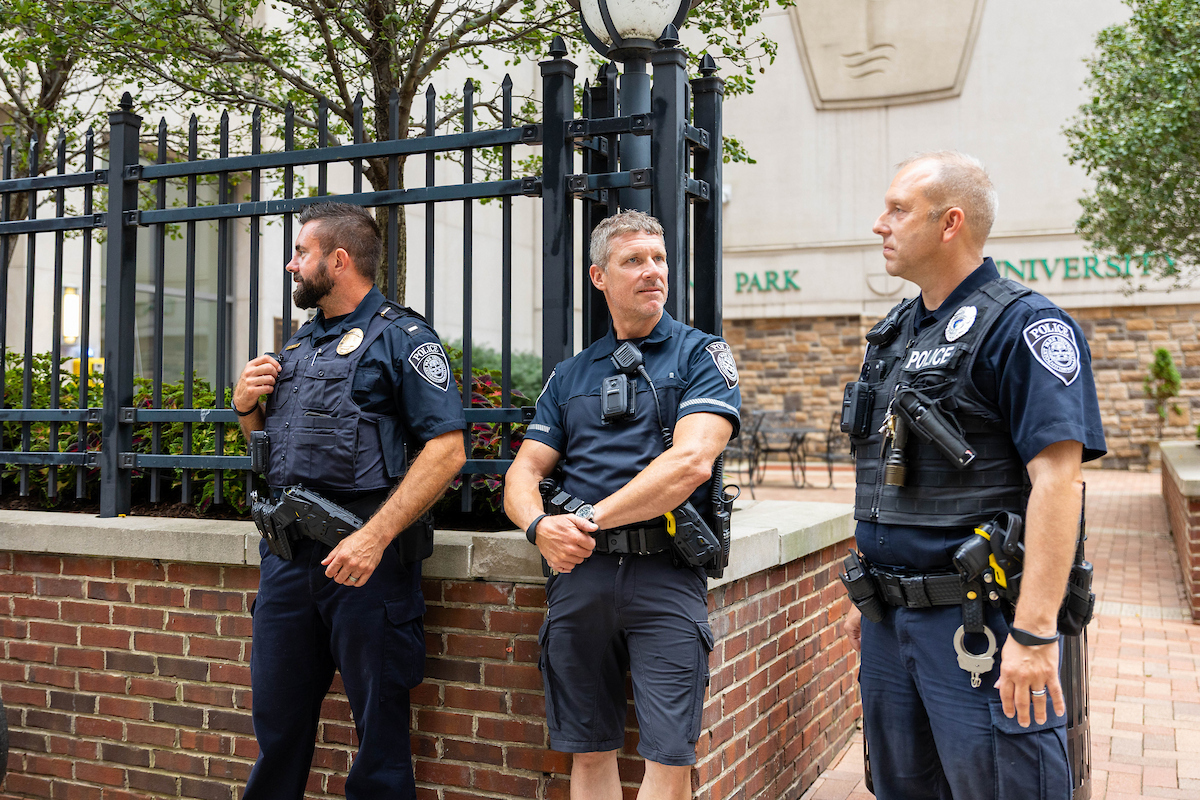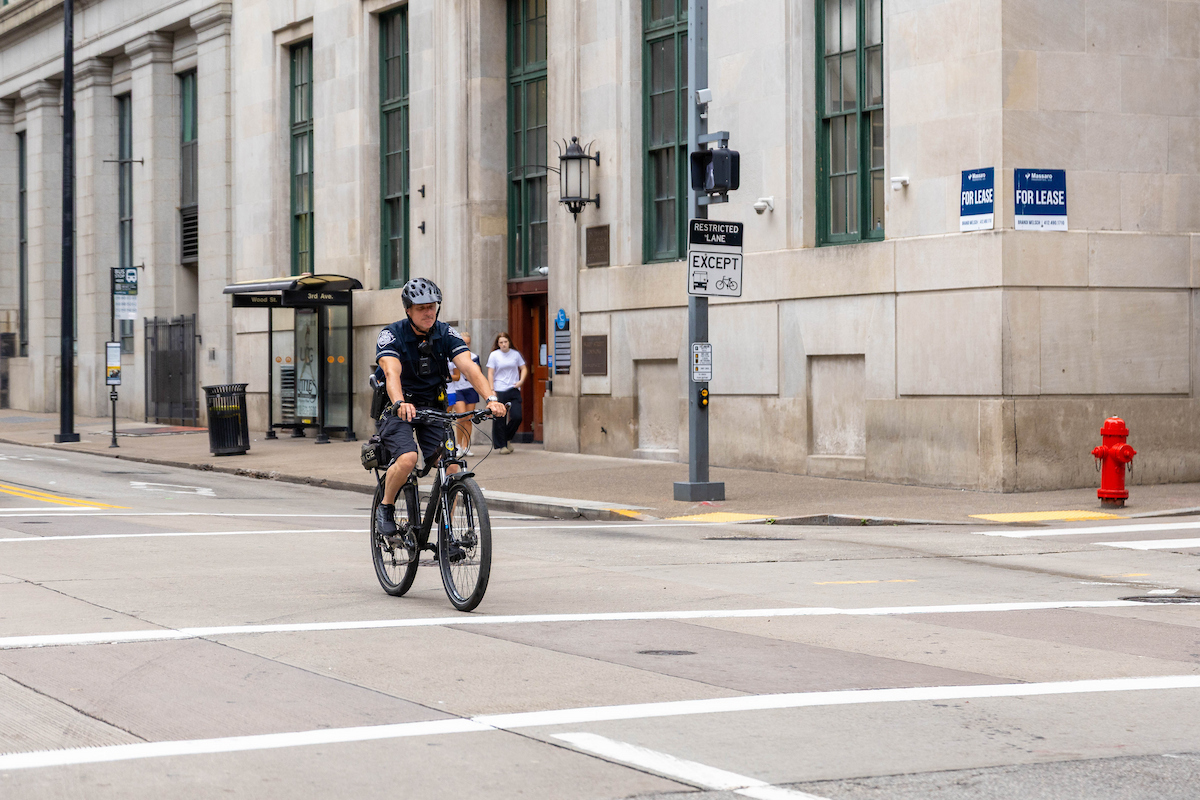Crime Prevention and Campus Security Guidance for new students and their families

Jeffrey Besong, chief of police at Point Park University, speaks with all incoming first-year and transfer students at orientation sessions to provide information and advice to newcomers on campus. Presentations are also conducted for family members to familiarize them with the Point Park University Police Department and address any questions or concerns.
Chief Besong provides a safety and security briefing to students each fall, giving tips and information on being safe off campus. Pamphlets are available throughout campus, which provide safety and security tips.
The university's emergency response plan can be reviewed, and emergency-related questions can be addressed at the Point Park University Police Department, located on the second floor of Frontier Hall.
Q&A with Chief Besong About Campus Safety
How would you describe the overall safety of this campus?
The overall safety of our campus can be described as vigilant, proactive and community-oriented, reflecting its urban setting. While no urban environment can be entirely free of crime, our campus is committed to maintaining a safe and secure atmosphere through the hard work of our police officers on a daily basis.
How does campus crime here compare to other colleges of similar size?
Point Park's crime statistics are broadly similar to other small, private Pittsburgh universities.
What is the typical response time for campus police when an incident is reported?
The average response time is under three minutes.
How does your department prepare for emergencies like active threats or natural disasters?
Our officers undergo frequent mandatory training sessions on response tactics for active threats. This includes advanced law enforcement rapid response training. Chief Besong and university administrators participate in facilitated discussions of hypothetical scenarios to test the Emergency Operations Procedure and improve decision-making under pressure. The department has pre-established relationships and mutual aid agreements with the Pittsburgh Police Bureau, Fire Department and other regional emergency services. They train together and have radio communications for major incidents.

How visible and active are police officers around campus on a daily basis?
The department operates around the clock. Coverage is strategically adjusted based on time of day and scheduled events. For example, there is a heavier presence when classes are late in the evening or when large events are happening Downtown.
The police presence at Point Park is designed to be highly visible, proactive and community-oriented. Our students expect to see officers daily through a mix of foot, bike and vehicle patrols. Their goal is to be a familiar and approachable part of the campus fabric, which not only deters crime but also ensures that when you need help, you know exactly who to turn to and they are never far away.
What role do police officers play in mental health crisis response on campus?
Our officers are typically the first ones called when an individual is in immediate danger to themselves or others due to a mental health crisis (e.g., severe suicidal ideation, erratic behavior, psychosis). Our officers also receive ongoing training in Crisis Intervention Training. This training teaches them to recognize the signs of mental health conditions, use verbal de-escalation techniques, have empathy and patience rather than authority and commands to resolve the crisis peacefully, connect the individual to help and not make an arrest unless absolutely necessary for safety.
What safety technologies are in place?
Point Park University utilizes a robust network of safety technologies. The foundation of emergency communication is the Point Alert system, a mass notification platform that broadcasts critical information via text message, email and social media during campus emergencies, severe weather or other imminent threats.
Complementing this are emergency phones strategically placed throughout campus; these blue-light phones provide a direct, immediate line to University Police with location identification for swift assistance. The campus is further secured by an extensive digital video surveillance system with hundreds of cameras, all monitored 24/7 by the University Police dispatch center.
Point Park University Police are armed, commissioned law enforcement officers who have body-worn cameras as standard equipment. Additional resources include a dedicated Safety Escort Service provided by University Police officers and the promotion of personal safety apps that integrate with campus security resources.
What measures are in place to keep students safe at night or during off-hours?
Our department implements a multi-layered strategy to keep students safe during night and off-hours, recognizing that security needs change when classes are not in session. Student safety during off-hours is protected by an integrated system of technology (including lighting, cameras and access control), active patrols, emergency phones and ongoing education. The goal is to create an environment where students feel secure and have multiple, reliable ways to get help if they need it, at any hour of the day or night.
Are there safety escort services or late-night transportation options?
Our police officers provide a free walking escort for any student, faculty or staff member to or from any location on campus and its immediate vicinity. In select situations, such as a medical need, Uber may be utilized to transport a student.
What does it mean to be PLEAC accredited?
The Pennsylvania Law Enforcement Accreditation Commission (PLEAC) is a voluntary, state-level program that establishes a comprehensive set of best practice standards for law enforcement agencies. It is administered by the Pennsylvania Chiefs of Police Association.
The Point Park University Police Department has been PLEAC accredited since 2013, which means we have proven our commitment to operating at the highest level of professionalism, efficiency and legality. Our department is well-led, well-trained and dedicated to providing the safest possible environment for our community.
What is the composition of the police force?
Our department is composed of a chief, lieutenant, sergeant, corporal and seven sworn police officers, as well as four dispatchers who manage all emergency and non-emergency calls, monitor security systems, dispatch officers and coordinate all working together to ensure a safe campus environment.
What is the jurisdiction of the Point Park Police?
The core jurisdiction of the Point Park University Police Department encompasses all property owned, leased, rented or otherwise under the control of the university. This includes academic and administrative buildings, residence halls, parking facilities and all associated grounds.
Our primary patrol area generally spans from Stanwix Street to Smithfield Street and from Fort Pitt Boulevard to Fifth Avenue. Within these boundaries, our officers exercise full law enforcement authority to ensure public safety, respond to incidents and enforce applicable laws and regulations.
Furthermore, in close collaboration with the Pittsburgh Bureau of Police through mutual aid agreements, our jurisdiction may extend as necessary to adjacent areas to address ongoing incidents, pursue suspects or provide assistance, ensuring a seamless and comprehensive security presence for the entire campus community.
What are the security measures to keep our residents safe in the dorms and apartments?
Our residence hall security is a top priority, supported by a multi-layered system of proactive and reactive measures. The foundation of this system is controlled access, with all exterior doors remaining locked 24/7, and entry is managed through electronic key card systems tailored to individual building assignments. Turnstiles in select facilities further restrict unauthorized access. Over 600 cameras are utilized in and around campus.
Complementing these physical measures, our human security presence includes Resident Assistants (RAs) living on each floor — trained to handle emergencies, enforce policies and serve as first points of contact — alongside live-in professional staff, who address escalated incidents and provide ongoing support.
Additionally, Campus Police officers conduct regular patrols inside and outside residence halls, monitoring for propped doors, suspicious activity and ensuring rapid response to any incidents.
What other police forces are nearby?
Our collaboration includes close partnerships with the Pittsburgh Bureau of Police, the Allegheny County Police, and the Port Authority Police. Additionally, we maintain active coordination with other university police departments within the Pittsburgh Council on Higher Education (PCHE), such as Duquesne University.
What does coverage look like during events like homecoming or move-in?
For move-in weekend, we implement a comprehensive and enhanced security plan. While the atmosphere is joyous and fun-filled, our priority remains the safety and security of every student, family member and guest. This means enhanced visible presence, traffic and crowd management, and mobilizing the entire department for the weekend.
In essence, our role is to work diligently behind the scenes and within the crowd to ensure that the joyous and fun-filled atmosphere of these special occasions is never disrupted, allowing our community to focus on making lasting memories.


